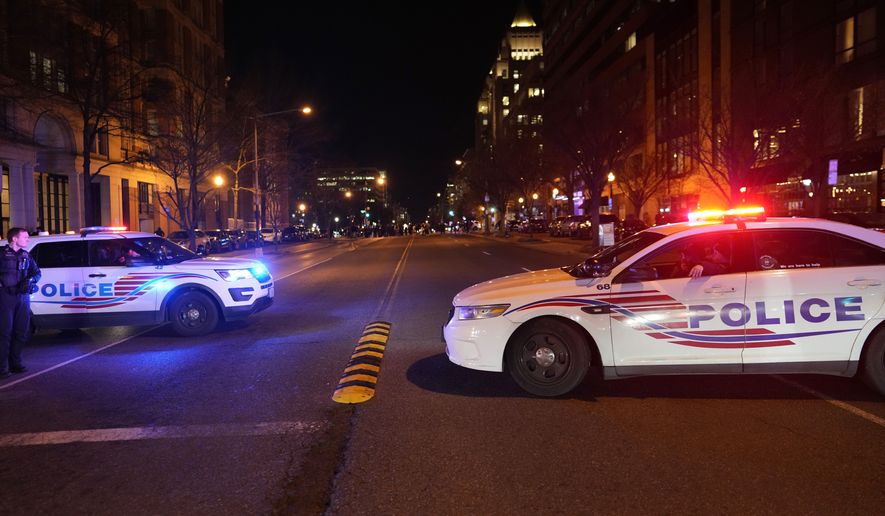The “defund-the-police” movement in the nation’s capital lost some ground Tuesday after city leaders, shaken by a bloody year of carjackings, shootings and robberies, voted to approve a legislative crackdown on crime.
The D.C. Council passed the massive Secure DC omnibus package by a 12-0 margin — though not without one significant, spur-of-the-moment amendment that took some bite out of the anti-crime bill.
Councilmember Kenyan McDuffie, at-large independent, introduced a last-minute proposal to scale back a “no-bail” proposal that would have empowered judges to more easily lock up violent adult and juvenile suspects awaiting trial.
Fellow legislators quickly threw their support behind the amendment, which received cheers from the dozens of anti-police activists packed inside the council chambers.
Brooke Pinto, the Ward 2 Democrat who championed the get-tough-on-crime aspects of the package, warned colleagues that congressional Republicans eager to end the District’s autonomy would accuse city leaders of being soft on crime.
“I need everybody to remember that we have some friends and opponents a couple blocks away who are very interested in getting involved in District affairs,” Ms. Pinto said during the hearing.
“It is not a theory or out-there concern when I say that there’s a strategy behind every provision in here to protect District interests,” she said. “We have very, very real threats when it comes to home rule and people wanting to take away our local government.”
Ms. Pinto said it had been less than a year since a bipartisan coalition of federal lawmakers overturned an earlier major rewrite to the District’s criminal code that lawmakers from both parties criticized as more concerned with the rights of criminals than victims.
Even President Biden, who was adamant about protecting the District’s right to self-governance, stepped aside when the time came to veto the congressional resolution to overturn the rewritten code.
The episode spotlighted the District’s growing crime crisis, which resulted in multiple congressional hearings and intense scrutiny of the woeful 33% prosecution rate from the U.S. attorney’s office, the federal prosecutors who handle most major crimes in the city.
The emergency legislation passed during the summer included tougher jailing standards that aimed to remove the small number of repeat offenders who drove the spike in robberies, record-high carjackings and the most homicides in more than 25 years.
Mr. McDuffie’s amendment called for ending the expanded authority of judges to hold violent suspects 225 days after the new omnibus takes effect.
After that, he wanted the tougher jailing standards to be studied to determine their effectiveness. The council would have to propose new legislation to bring back the pretrial jailing.
Data on the District’s jail population showed that the number of inmates increased by more than 300 from July — when the temporary law first took effect — through December.
Activists who attended the tense council hearing were jubilant about the tighter jailing procedures being allowed to expire.
Frankie Seabron, a community organizer with anti-prison group Harriet’s Wildest Dream, told The Washington Times that it will restore American law’s principal tenet of “innocent until proven guilty” for violent suspects.
“For pretrial, the threshold for probable cause is very low,” she said. “It’s the police officers who get to write those police reports, the judges then go and look at that through the [affidavit] and say, ‘Oh, I think you may have committed that crime.’ That’s still not a conviction, so we can’t assume guilt.”
One element of the summer’s emergency legislation that was preserved was Ms. Pinto’s “endangerment with a firearm” offense.
The new crime makes it a felony to shoot a gun in public — even if it isn’t aimed at anyone. Ms Pinto has argued that it closes a loophole where some shooters could be charged only with reckless endangerment since no one was harmed.
Another area that all legislators sought to address was the current overly strict definition of carjacking.
Under the current law, a victim has to be physically inside of their car and forced out by a perpetrator for the charge to hold up in court.
If the victim is mugged for their car keys while standing near their car — such as at a gas pump or walking into their home — the thief could be charged only with armed robbery.
That change would mean more jail time for violent car thieves, who can get up to 15 years behind bars for an offense, as opposed to 3-7 expected for first-time robbers.
Ringleaders of retail theft crews could also get 15 years in prison, according to the legislation, and the felony theft threshold would be lowered from $1,000 to $500. Further, the Metropolitan Police Department would have the authority to declare 100-square-foot “drug-free” zones for up to 15 days.
The latter provision, which was initially instituted in the 1990s before the council repealed it about a decade ago, is intended to break up the kinds of drug-related gatherings that legislators and police leaders say contribute to violent crime.
“Strangulation” would become its own felony offense in the bill, and the proposal would also bring back a penalty for wearing a ski mask while committing a crime.
The amended bill does roll back some of the police discipline and oversight procedures that it proposed relaxing, such as limiting public access to officer discipline records.
• Matt Delaney can be reached at mdelaney@washingtontimes.com.




Please read our comment policy before commenting.